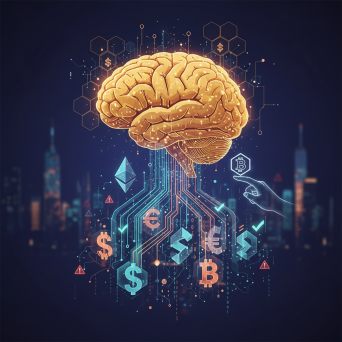AI Predicts Cryptocurrency Prices: A Realistic Approach to Crypto Analytics

The world of cryptocurrencies is constantly changing, and with it, the prices of digital assets like Bitcoin and Ethereum. Successful investing often depends on the ability to anticipate these changes. Can artificial intelligence be the key to accurate cryptocurrency prediction? This guide explores how AI predictions are transforming crypto analytics, offering a realistic view of the possibilities and challenges.
How AI Analyzes Market Data for Price Prediction
Machine learning, a branch of artificial intelligence, provides powerful tools for analyzing vast amounts of data that influence cryptocurrency prices. Let's look at the main methods:
- Regression Analysis: This statistical method helps establish a relationship between one or more independent variables (e.g., trading volume, historical prices, volatility indicators) and the dependent variable – the future price. It is one of the simplest yet effective methods for initial analysis.
- Neural Networks: Particularly Recurrent Neural Networks (RNNs) and Long Short-Term Memory (LSTM) networks are excellent for analyzing time series data, such as cryptocurrency price movements. They can identify complex, non-linear patterns that might be missed by traditional methods.
- Natural Language Processing (NLP): Cryptocurrency prices are significantly influenced by market sentiment, news, and discussions on social media. NLP allows AI to analyze text from news outlets, Twitter, Reddit, and other platforms, identifying positive or negative sentiments that can impact supply and demand.
Creating a Simple AI Model for Prediction
While building a complex model requires in-depth knowledge, a basic model can be constructed by following these steps:
- Data Collection: Historical price data (open, close, high, low, volume) for a chosen cryptocurrency, such as Bitcoin or Ethereum, as well as relevant market indicators, are needed.
- Data Preparation: Data should be normalized, cleaned of errors, and split into training and testing sets.
- Model Selection: To start, you can try simple models like linear regression, or more complex ones like LSTM networks, using artificial intelligence libraries such as TensorFlow or PyTorch.
- Model Training: The model learns from the training data, identifying patterns.
- Evaluation and Testing: The model's performance is evaluated on test data using metrics like Mean Absolute Error (MAE) or Mean Squared Error (MSE).
It is important to remember that even the most advanced AI models cannot guarantee 100% accuracy. The cryptocurrency market remains extremely volatile.
Challenges and Limitations of AI Predictions
Despite its potential, cryptocurrency prediction using AI faces several challenges:
- Market Volatility: Sudden changes caused by news, regulatory shifts, or large transactions are difficult to predict.
- Data Quality and Availability: High-quality, complete, and up-to-date data are necessary for effective model training.
- Overfitting: A model might adapt too closely to historical data, losing its ability to predict future trends.
- Ethical Considerations: The use of AI can lead to market manipulation if applied unethically.
Tips for Choosing Tools and Data
For successful crypto analytics using AI:
- Explore Tools: Familiarize yourself with popular machine learning libraries (Scikit-learn, TensorFlow, Keras, PyTorch) and data handling platforms (Pandas, NumPy).
- Choose Reliable Data Sources: Use APIs from major cryptocurrency exchanges (Binance, Coinbase), data aggregators (CoinMarketCap, CoinGecko), and news monitoring services.
- Start Small: Try predicting the prices of one or two popular cryptocurrencies first before moving to more complex tasks.
- Do Not Rely Solely on AI: Combine AI predictions with your own analysis, market understanding, and portfolio diversification.
Artificial intelligence opens new horizons for cryptocurrency prediction, making crypto analytics more powerful. While complete automation is not possible, integrating AI into investment strategies can provide a significant competitive advantage, helping to make more informed decisions in the dynamic crypto market.
Comments
Loading comments...
No comments yet
Sign in to leave the first comment


